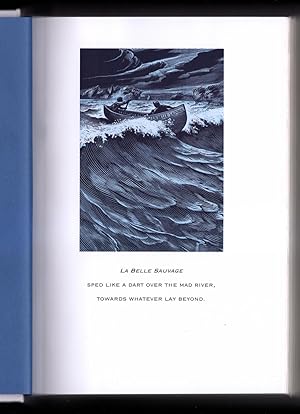World is crazier and more of it than we think,
Incorrigibly plural.
Pullman or his editor puts ellipses there, but it's a full stop. Maybe that's to let you know it comes from the middle of a longer poem, maybe to lead you into the story.
The text from Spenser's nigh-unread epic which comes after the last page is drawn from the final stanza of the first book (I XII 42):
Now strike your sails yee jolly Mariners,
For we be come into a quiet rode,
Where we must land some of our passengers,
And light this weary vessel of her lode.
Here she a while may make her safe abode,
Till she repaired have her tackles spent,
And wants supplied. And then againe abroad
On the long voyage whereto she is bent:
Well may she speede and fairely finish her intent.
Spelling is normalized to an extent, with some of the quaintness left in. The spelling of fairely, for one thing, recalls faerie. Again, the words To be continued... follow, with ellipses. This time it's presumably for the twofold purpose to lead you back out into the world and to lade you with yearning for more books.
Suffused within that combination of motives and between these two poems we get the story itself. La Belle Sauvage may be divided more or less into two parts: everything leading up to ch 15, The Potting Shed, and everything which follows with the flood, which provides the book its frontispiece--

--And the Biblical story of the Flood is certainly the most important of the allusions Pullman plays upon, just as the Fall had been in his earlier work.
Perhaps the two parts resemble the two poems, the former gradually revealing the "incorrigibly plural" nature of what had appeared to Malcolm a single, sensible world; divided though his world of the priory and the inn may be by the river ceaselessly flowing between, they are just as much linked, since he in his canoe can move freely over it. He also literally reads about and discusses the mysteriously multiple nature of the physical world with Dr Hannah Relf, and so comes into contact with his own destiny as a scholar, as readers will know who have met him in Lyra's Oxford, set after the events of the original His Dark Materials. Dr Relf herself appears as early as The Golden Compass, if I remember right; so that Pullman in these books is continually unfolding the multiple worlds of his characters' stories, weaving together those which most nearly account for the view of the world he seems to care about: one in which people read books and poems and cook Brussels sprouts with crosses cut into the base and care for children, neighbors and strangers alike, and stand up to tyrannical authority.
Anyhow, I've finally sat down and read "Snow," and I'm slowly working through at least Book I of Faerie Queene. I looked but haven't yet been able to find any analyses of Pullman's references to these sources. More to the point, I'm reading La Belle Sauvage through again with Steph, so that will help when I come to say more about all this.
As I work on essays I'll post more ideas here, and then when I'm through my series of podcasts on EarthBound, Philip Pullman's books will be next!



No comments:
Post a Comment